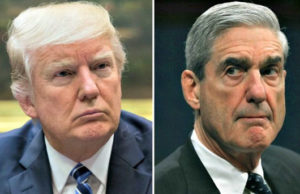by WorldTribune Staff, June 3, 2018
Not only can President Donald Trump not be subpoenaed in the Russia investigation but he can essentially shut down the probe by pardoning anyone targeted by special counsel Robert Mueller, a law professor said.

The U.S. Constitution suggests that only the impeachment process can take out a sitting president, not a prosecutor, George Washington University Law School Professor John F. Banzhaf told Washington Exmainer columnist Paul Bedard.
Banzhaf said Trump has several ways to thwart Mueller, including a move “to directly or indirectly assure those under investigation that they will be pardoned if they don’t agree to be flipped by Mueller. Going a step further, since there seems to be clear precedent for such presidential action, would be for Trump to issue blanket all-crimes pardons to anyone under possible investigation.”
Bedard, in a June 3 column, noted that Banzhaf’s analysis followed the leak of a Trump team memo to Mueller that questioned whether the president could be taken to court.
“Indeed, some commentators have suggested that Trump’s earlier decisions to pardon Lewis ‘Scooter’ Libby and Sheriff Joe Arpaio, his more recent decision to pardon Dinesh D’Souza, and his statement that he might pardon Martha Stewart and Rod Blagojevich,were meant, at least in part, to signal to those being pressured to ‘flip’ that he is likely to remove the prosecutor’s threats by being willing to issue pardons to them,” Banzhaf said.
He added, “by these actions, Trump is reassuring those who may be under investigation by Mueller that they need not bow to threats of prosecution, and reveal sensitive information to investigators, because a similar pardon will protect all those who remain loyal to the president.”
Banzhaf noted that Hillary Clinton, if she became president, could pardon herself in the email scandal.
“It seems clear that a full and absolute pardon can be issued, even without naming any of the crimes which might have been committed, or waiting until formal charges are brought or even sought. As the Supreme Court has said, the pardon power ‘may be exercised at any time after its commission, either before legal proceedings are taken, or during their pendency, or after conviction and judgment,’ ” the law professor said.
Subscribe to Geostrategy-Direct __________ Support Free Press Foundation
